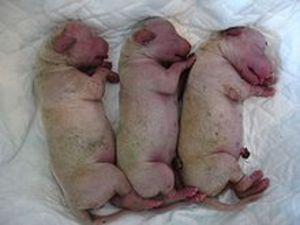Although thought of as a problem for older dogs, constipation can happen at any stage of a dog’s life, including “puppyhood”. Constipation is often caused by not enough water or fiber in the diet. Puppies get plenty of moisture in their diets, whether from soft canned food or from mother’s milk. Constipation can also happen from a change in diet, from a bowel obstruction or as a complication of another disorder.
It can be difficult to determine whether smaller puppies are straining and not able to produce stool. Young puppies under three months old are often unsteady on their paws or like to do a semi-crouch before pouncing. If unsure if a puppy is squatting because of constipation, it is often best to get down on one’s hands and knees in order to get a better view of the puppy’s overall body position.
Common Signs
Puppies with constipation squat as they normally do when producing a bowel movement. But constipated stool is hard and difficult to pass. The puppy may take a deep breath in order to push some more. Keeping the squat position can be difficult, so the puppy may waddle forward to try and push or do a series of squats with a rest in between each bout of straining.
Healthy puppies are quite plump until they reach about six months of age. In an older puppy, it’s easier to see if the abdomen is distended, but this may be difficult in a younger puppy. Gently pet the abdomen and if the puppy flinches, yips or if the abdomen seems rock-hard, this could be constipation.
What About Blood?
Because of straining and the roughness of hard stools, small blood vessels in the rectum may be broken. This may cause whatever stools that pass to have a dollop of bright red blood on them. If a puppy is very constipated, then only a dollop of blood may pass. Constipation can be amazingly painful, but having an itchy and bleeding rectum on top of the bloating and cramps may make a puppy cranky.
The puppy may also clean under its tail more often in a vain effort to try and help loosen the passage of stools. If there is any blood and the puppy cleans itself, some of that blood may be on the nose or mouth. The puppy may also scoot as if trying to clear impacted anal glands. The puppy may leave some blood from the area scooted on.
Newborns or Orphans
If the puppy is still nursing or has been orphaned, it is important that the tiny puppy defecate every day. The body is so small that an overload of toxins from constipated stool may kill it. Orphaned puppies need to have their genital-anal region stimulated with a cotton ball or cloth with lukewarm water on it after every feeding. The puppy will whimper, yip, have a hard, distended belly and will be more restless than usual. Call a vet if the constipation has not cleared up in 24 hours.
Resources:
Dog Owner’s Home Veterinary Handbook, 4th edition.” Debra M. Eldredge, DVM, et al. Howell Book House; 2007.
ASPCA Complete Guide to Dogs.” Sheldon L. Gerstenfeld, VMD. Chronicle Books; 1999
The Veterinarians’ Guide to Your Dog’s Symptoms.” Michael S. Garvey, DVM, et al. Villard; 1999.
Reference:
- www.petplace.com/dogs/constipation-in-dogs/page1.aspx
- www.vetinfo.com/relieving-puppy-constipation.html
- www.google.com/search?hl=en&rls;=com.microsoft%3Aen-US&q;=care+of+orphaned+puppies&aq;=0=
